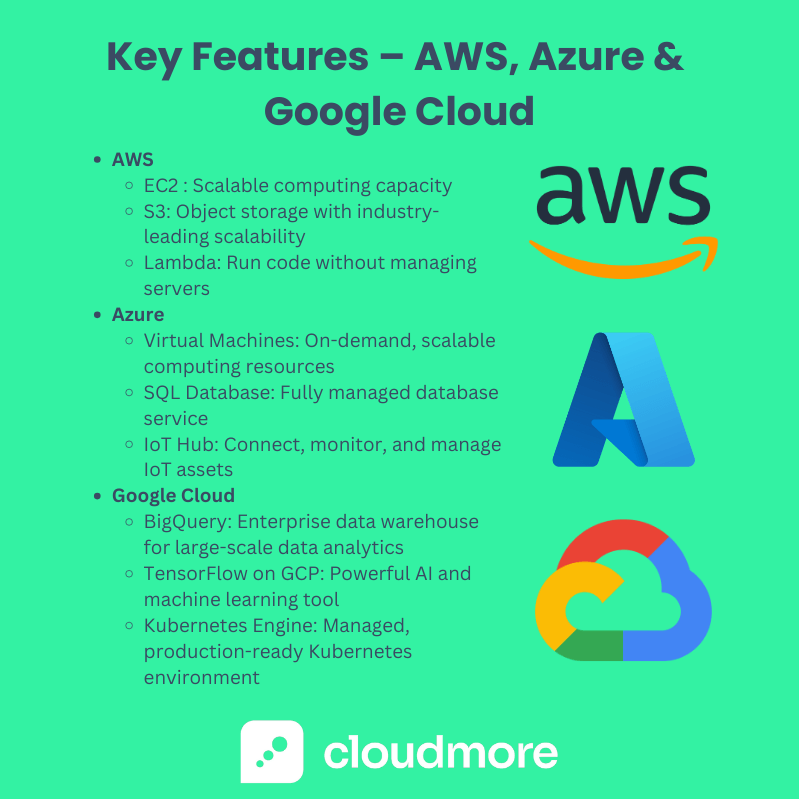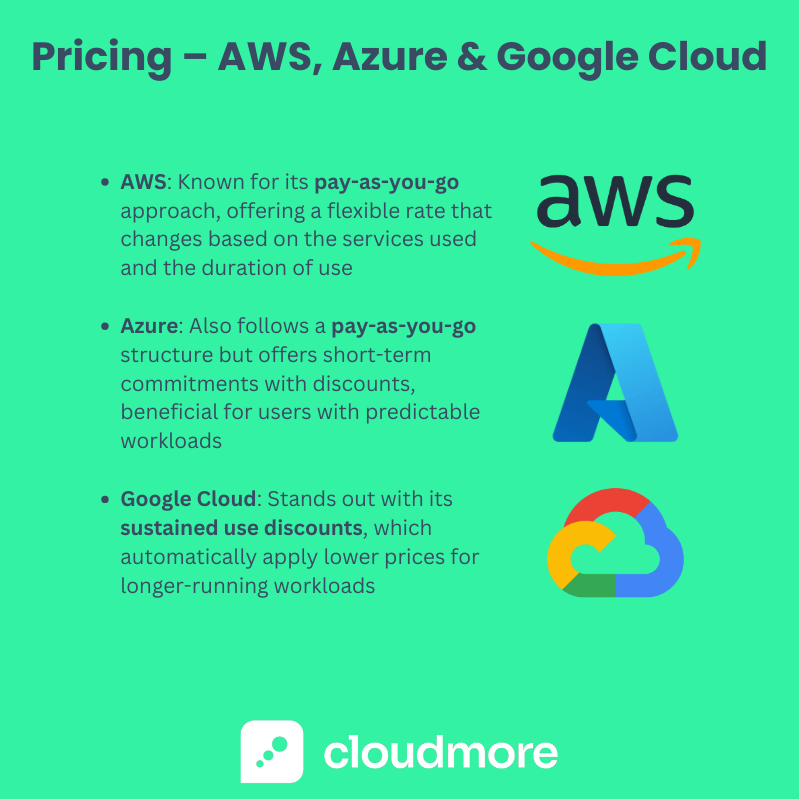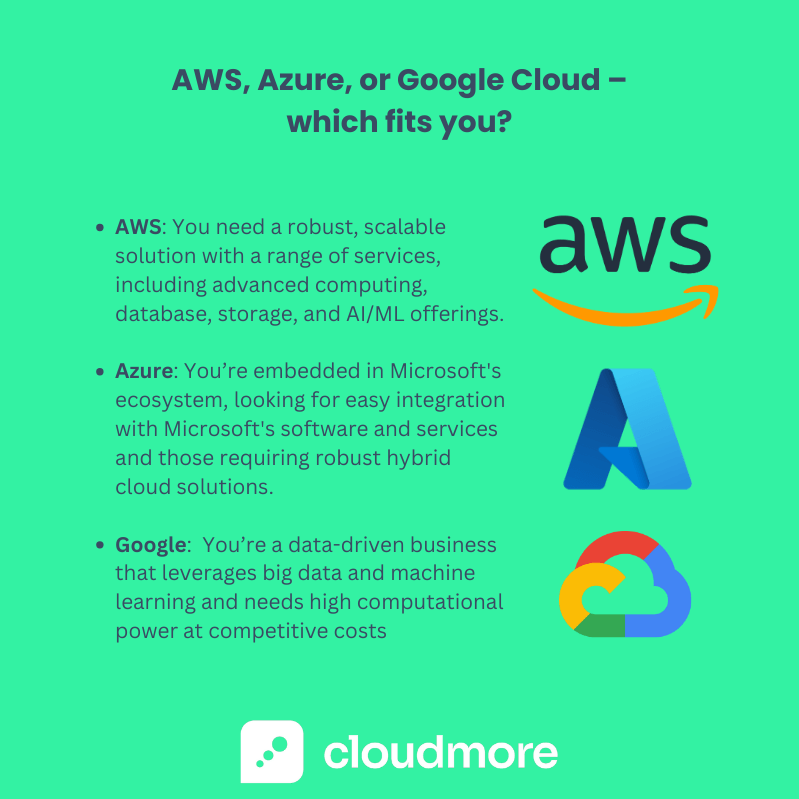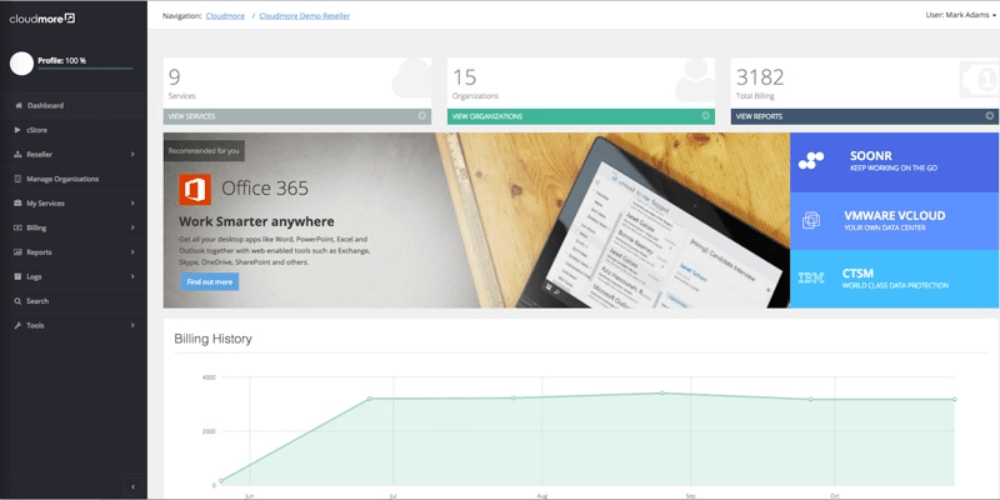AWS vs Azure vs Google Cloud - Key Cloud Services Comparison
Cloud computing has become a cornerstone of technological advancement and business innovation.
As the demand for scalable, efficient, and cost-effective solutions rises, cloud services have emerged as the pivotal answer to these needs.
Leading this transformation are three giants: Amazon Web Services (AWS), Microsoft Azure, and Google Cloud Platform (GCP).
These platforms have redefined how businesses operate, offering unparalleled flexibility and power to drive growth and innovation.
In this blog, we delve into a comprehensive comparison of AWS, Azure, and Google Cloud.
You'll gain critical insights into each platform's unique offerings, from computing power and storage solutions to pricing models and security features.
Whether you're a business leader making strategic decisions, a developer looking for the best tools, or just keen on understanding the cloud landscape, this article is your gateway to informed decisions in the cloud computing domain.
Understanding the Giants - AWS, Azure, and Google Cloud
Navigating the cloud computing landscape can be daunting. With AWS, Azure, and Google Cloud leading the charge, understanding their unique strengths is key to making the right choice for your needs.

Amazon Web Services (AWS) - A Pioneer in Cloud Computing
AWS began its journey in 2006, revolutionizing the way companies access computing resources. As a trailblazer in cloud services, AWS has continuously evolved, offering an extensive array of services that cater to various business needs.
Key offerings include:
- EC2 (Elastic Compute Cloud): Scalable computing capacity
- S3 (Simple Storage Service): Object storage with industry-leading scalability
- RDS (Relational Database Service): Managed relational database service
- Lambda: Run code without managing servers
- CloudFront: Fast content delivery network service
AWS is not just about size; it's about constant innovation and a vast ecosystem of services, making it a go-to choice for businesses of all scales.
Microsoft Azure - The Corporate Cloud Powerhouse
Emerging as a major competitor to AWS, Microsoft Azure made its debut in 2010. It has quickly become synonymous with enterprise-level cloud computing. Azure’s rise is backed by its integration with Microsoft’s software and services, a significant advantage for many organizations.
Core services include:
- Azure Virtual Machines: On-demand, scalable computing resources
- Azure SQL Database: Fully managed database service
- Azure Active Directory: Identity services for secure access
- Azure Kubernetes Service (AKS): Simplified Kubernetes deployment
- Azure IoT Hub: Connect, monitor, and manage IoT assets
Azure blends perfectly with existing Microsoft infrastructures, offering a seamless transition to the cloud for numerous businesses, especially those already vested in Microsoft products.
Google Cloud Platform (GCP) - Innovation and Data Analytics Expert
GCP entered the market with a strong focus on high computer offerings and big data solutions. Known for its expertise in data analytics and open-source technologies, Google Cloud offers cutting-edge services that appeal to innovators and data scientists alike. Notable services include:
- Compute Engine: High-performance, scalable virtual machines
- BigQuery: Enterprise data warehouse for large-scale data analytics
- Cloud Storage: Object storage with global edge-caching
- TensorFlow on GCP: Powerful AI and machine learning tool
- Google Kubernetes Engine: Managed, production-ready Kubernetes environment
Google Cloud is a compelling choice for those who prioritize data analytics and machine learning capabilities, underpinned by Google’s commitment to innovation and open-source solutions.
Comparative Analysis of Key Services
Selecting the right cloud services is crucial for optimizing your business's performance and efficiency. Let's dissect and compare the key offerings from AWS, Azure, and Google Cloud to guide you in making an informed decision.
Computing Power
When it comes to computing power, the choice often boils down to AWS EC2, Azure VMs, and Google Compute Engine.
AWS EC2 offers a wide range of instances, including options for high compute, memory, or storage capacity, making it highly adaptable to various workloads.
Azure VMs stand out with their deep integration with other Azure services and Microsoft software, offering a familiar environment for Windows-based systems.
Google Compute Engine is renowned for its high-performance computing and live migration of VMs, making it a strong contender for heavy computational tasks.
Storage Solutions
Storage is a critical aspect of cloud services.
AWS S3 is known for its robustness and extensive range of storage classes, catering to diverse needs like data archiving or frequent access.
Azure Blob Storage integrates seamlessly with Microsoft's ecosystem, offering a reliable solution for large-scale data storage with tiered options.
Google Cloud Storage shines with its multi-regional storage capabilities and optimal performance for data-intensive applications.
Networking Capabilities
Efficient networking capabilities are vital for cloud infrastructure.
AWS VPC allows you to provision a logically isolated section of the AWS Cloud, giving you complete control over your virtual networking environment.
Azure's VNet provides a similar functionality, enabling secure and seamless connectivity across Azure services.
Google Cloud's VPC offers global networking for creating a robust, interconnected cloud setup.
Cloud AI and Machine Learning Services
AI and Machine Learning services are at the forefront of cloud computing innovation. AWS offers a comprehensive suite of AI and machine learning services, including SageMaker for machine learning models and Lex for chatbots.
Azure’s AI and machine learning services are deeply integrated with other Microsoft products, making them ideal for businesses heavily invested in the Microsoft ecosystem.
Google Cloud's AI and machine learning services, like TensorFlow and AutoML, are industry leaders, particularly in data analysis and innovative AI solutions.
Pricing and Cost Management
Navigating the pricing models of cloud services can be as complex as it is crucial. A clear understanding of how AWS, Azure, and Google Cloud structure their pricing is essential for effective budget management and cost optimization.

Understanding the Pricing Models
Each cloud provider has its unique pricing model, which can significantly impact your cloud budget
AWS pricing is known for its pay-as-you-go approach, offering a flexible rate that changes based on the services used and the duration of use. This model is ideal for businesses looking for scalability without upfront costs.
Azure’s pricing also follows a pay-as-you-go structure but offers short-term commitments with discounts, beneficial for users with predictable workloads. Google Cloud’s pricing stands out with its sustained use discounts, which automatically apply lower prices for longer-running workloads, a feature that’s highly cost-effective for continuous operations.
Calculating Total Cost of Ownership (TCO)
Understanding the Total Cost of Ownership (TCO) is key to making informed decisions. AWS, Azure, and Google Cloud all offer TCO calculators to help you estimate the costs of their services. AWS’s TCO calculator provides a detailed analysis of the cost savings when moving to AWS compared to on-premises or colocation environments.
Azure's TCO calculator emphasizes the cost benefits of Azure over on-premises solutions, considering factors like scalability, security, and compliance. Google Cloud's pricing calculator is intuitive, offering a direct comparison between Google Cloud services and other providers, focusing on long-term savings.
Cost-Effective Scenarios
Each cloud platform can be more cost-effective depending on specific use cases.
AWS often leads in cost-efficiency for diversified workloads, especially when leveraging its Reserved Instances or Savings Plans for long-term commitments.
Azure can be the most cost-effective for businesses heavily reliant on Microsoft products or for hybrid cloud scenarios.
Google Cloud tends to be the most economical for data-intensive and machine learning workloads, especially with its innovative pricing models that reward sustained use.
Security and Compliance
In today's digital age, security and compliance are not just buzzwords; they are crucial pillars of any cloud service.
AWS, Azure, and Google Cloud each offer robust security features and compliance certifications, ensuring your data's safety and regulatory adherence.
AWS Security and Compliance
AWS provides a comprehensive security model, from physical data center security to network and application layer protection. Key features include:
- Identity and Access Management (IAM): Control user access to AWS services and resources.
- Amazon CloudTrail: Monitor and record account activity across your AWS infrastructure.
- AWS Shield: Protect against Distributed Denial of Service (DDoS) attacks.
- Compliance Programs: AWS supports numerous compliance certifications, including GDPR, HIPAA, and SOC.
AWS ensures that your cloud environment is not just powerful but also protected and compliant with global standards.
Azure Security and Compliance
Microsoft Azure emphasizes security within its core architecture, providing tools and features to safeguard your data. Its security offerings include:
- Azure Active Directory: Manage user identities and access controls.
- Azure Security Center: Unified security management system that strengthens the security posture.
- Azure Information Protection: Protect sensitive information across your digital landscape.
- Compliance Offerings: Azure meets a broad set of international and industry-specific compliance standards, such as ISO 27001, PCI DSS, and FedRAMP.
With Azure, you benefit from Microsoft’s decades of experience in building secure software and services.
Google Cloud Security and Compliance
Google Cloud's approach to security incorporates the extensive expertise Google has developed securing its own services. Its security features include:
- Google Cloud Identity & Access Management (IAM): Fine-grained access control and visibility.
- Data Loss Prevention API: Discover and redact sensitive data.
- Google Cloud’s Security Command Center: Centralized vulnerability and threat reporting.
- Compliance Resources: Google Cloud complies with important standards like GDPR, HIPAA, and ISO/IEC 27001.
Google Cloud provides cutting-edge security, ensuring your data is protected by the same secure-by-design infrastructure Google uses.
Ease of Use and Developer Tools
Choosing the right cloud platform is not just about power and price. It's also about how easily you can navigate and utilize their services. AWS, Azure, and Google Cloud each offer unique interfaces and tools, along with comprehensive community support and learning resources.
User Interfaces and Developer Tools
- AWS: Known for its extensive range of services, AWS offers a somewhat complex interface. However, the AWS Management Console and AWS CLI (Command Line Interface) are powerful tools for developers. Additionally, AWS provides a rich set of developer tools like AWS CodeBuild, CodeDeploy, and CodePipeline for CI/CD, which streamline the development process.
- Azure: Azure’s interface is particularly user-friendly, especially for those already familiar with other Microsoft products. Azure offers an integrated set of tools in the Azure Portal, along with Azure CLI and PowerShell support. For developers, Azure DevOps provides an end-to-end DevOps toolchain for planning, development, and deployment.
- Google Cloud: Google Cloud’s interface is clean and intuitive, making it a great option for those new to cloud computing. With Google Cloud Console and Cloud Shell, interaction and management of services are streamlined. Google also offers robust tools for developers, including Cloud SDK and various client libraries.
Community Support and Learning Resources
- AWS: AWS has a vast and active community. Resources like AWS Documentation, AWS Whitepapers, and the AWS Training and Certification program provide comprehensive learning materials. AWS also hosts re:Invent, a learning conference for the global cloud computing community.
- Azure: Microsoft’s strong presence in the developer community translates into robust support for Azure. Azure Docs, Microsoft Learn, and various certifications offer a wealth of information. Additionally, Microsoft hosts numerous events and webinars, such as Microsoft Ignite.
- Google Cloud: Google Cloud’s community is rich with innovative and open-source enthusiasts. Resources like Google Cloud Documentation, Qwiklabs, and Coursera offer in-depth learning experiences. Google Cloud Next is their flagship event, bringing together industry experts and developers.
Which One Should You Choose?
Deciding between AWS, Azure, and Google Cloud can be complex, but understanding their distinct advantages and limitations will guide you to the right choice for your business needs.
Choosing the Right Platform for Your Needs
Each cloud service provider has unique offerings that cater to different business models and requirements.

Here’s a recap of what each brings to the table:
AWS
- Strengths: AWS offers the most extensive range of services and global infrastructure. It's ideal for businesses looking for scalability, comprehensive toolsets, and a mature cloud environment.
- Weaknesses: The vast array of services can be overwhelming, and its pricing model can be complex to navigate for newcomers.
- Best For: Businesses looking for a robust, scalable solution with a wide range of services, including advanced computing, database, storage, and AI/ML offerings.
Microsoft Azure
- Strengths: Azure seamlessly integrates with Microsoft products, making it a preferred choice for organizations relying on Microsoft software. It offers strong support for hybrid cloud environments.
- Weaknesses: Azure may have a steeper learning curve for users not familiar with Microsoft's ecosystem.
- Best For: Enterprises embedded in Microsoft's ecosystem, looking for easy integration with Microsoft's software and services, and those requiring robust hybrid cloud solutions.
Google Cloud Platform (GCP)
- Strengths: GCP stands out in big data and analytics, open-source technologies, and high compute offerings. It’s known for competitive pricing and deep investment in machine learning and AI.
- Weaknesses: Has a smaller market share and fewer global data centers compared to AWS and Azure.
- Best For: Data-driven businesses that leverage big data, machine learning, and need high computational power at competitive costs.
Guideline for Selection
When selecting a platform, consider these factors:
- Compatibility with Existing Infrastructure: Assess how well each cloud service integrates with your current setup.
- Specific Business Needs and Goals: Identify the specific services and tools you need. For instance, choose GCP for strong AI and machine learning capabilities, Azure for seamless Microsoft integration, or AWS for a comprehensive set of services.
- Budget and Pricing Structure: Understand the pricing model of each platform to choose one that aligns with your financial plans.
- Skillset of Your Team: Consider the familiarity and expertise of your team with each platform.
Key Takeaways about AWS, Azure, and Google Cloud
As we wrap up our exploration into the dynamic world of AWS, Azure, and Google Cloud, let's reflect on some final thoughts about this evolving landscape:
- Continual Innovation: All three platforms are at the forefront of cloud computing innovation, each bringing unique strengths to the table - AWS with its vast service offerings, Azure with its deep Microsoft integration, and Google Cloud with its focus on analytics and AI.
- Tailored Solutions for Varied Needs: Whether you're a startup, a large enterprise, or somewhere in between, there's a cloud solution that fits your specific requirements.
- Competitive and Evolving Market: The competition among these giants benefits users, leading to better services, more innovations, and more attractive pricing models.
- Emphasis on Security and Compliance: With increasing digital threats, all three platforms prioritize security and compliance, ensuring your data remains safe and adheres to global standards.
- The Importance of Skilled Professionals: As cloud technologies grow more complex, the value of having skilled professionals who can navigate these platforms efficiently cannot be overstated.
The cloud is more than just a technology; it's a catalyst for transformation.
AWS, Azure, and Google Cloud are leading this charge, each offering a gateway to unparalleled efficiency, innovation, and growth.
Your journey into the cloud starts with a choice, and that choice should align with your vision, strategy, and operational needs. The future is in the cloud, and the time to embark on this journey is now.
Share this
You May Also Like
These Related Stories

Public vs Private Cloud - Key Differences & Examples

What is Cloud Computing: Definition, Use Cases & Examples



